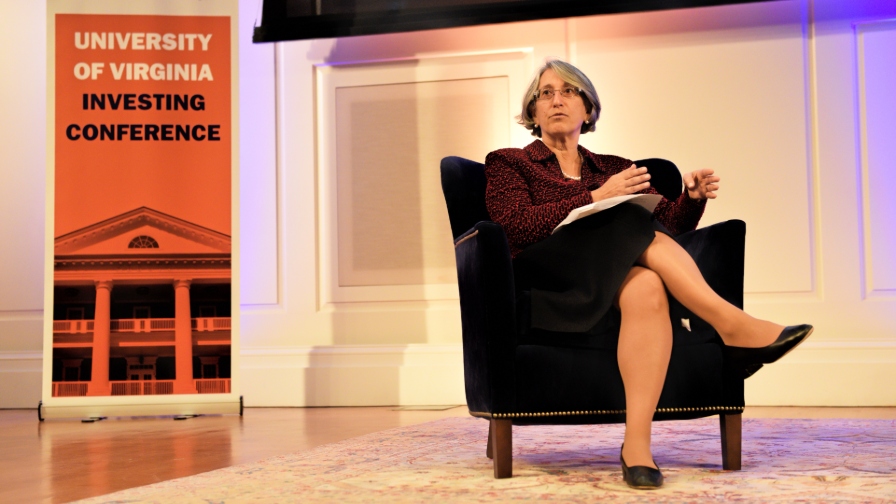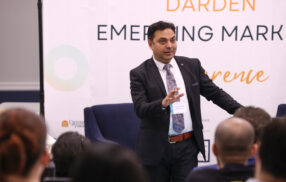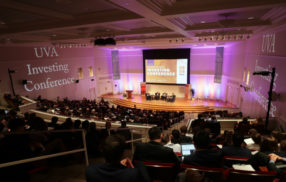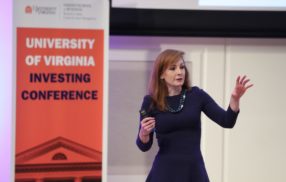
UVA Investing Conference: Purpose-Driven and ‘Super Weird’ Strategies to Drive Future of Benchmark-Beating Returns
By Dave Hendrick
In a world where passive index investments have posted double-digit annual returns in recent years, the search for benchmark-beating performance often treads into niche, even experimental territory.
The 2019 University of Virginia Investing Conference, hosted by the Richard A. Mayo Center for Asset Management at the Darden School of Business, turned its attention to the prospects for differentiated returns with a conference themed around “the future of alpha.” The event featured both practitioners at the forefront of new trends in quantitative investing and machine learning and leaders of established industry titans such as BlackRock, KKR and Markel.
Speaking at the opening session, BlackRock Co-founder and Vice Chair Barbara Novick offered her perspective on the changing landscape of asset management and the influential investment giant’s focus on long-term investing.
BlackRock, which manages nearly $7 trillion in assets in a variety of investment vehicles, made a splash in early 2019 when company Chairman and CEO Larry Fink explicitly linked purpose with profits and called for stakeholder-minded corporate leadership.
“We see purpose as a really fundamental aspect of any company,” said Novick.
Without an understanding of a company’s purpose and stakeholder needs, an organization can tend toward a short-term outlook driven by immediate trends, rather than fundamentals, Novick said.
Taking a stakeholder, purpose-driven mindset is not driven by altruism, Novick said — it’s good business.
In an era of record-low unemployment in which businesses are seeking to attract the best talent in a competitive environment, how can one not view employees as a key stakeholder, Novick asked. Similarly, what business could be expected to thrive without taking its customers — another key stakeholder — into account when making business decisions.
It’s an approach so commonsensical, even Milton Friedman — the economist whose theory of shareholder primacy is often presented as oppositional to a stakeholder approach — would agree with many of its fundamentals, Novick said.
Novick also discussed the rise of more explicitly stakeholder-oriented funds that take into account environmental, social and governance factors, or ESG funds.
BlackRock offers a variety of such funds and sees the issue, in part, as one of consumer choice, Novick said. ESG investing is complicated, however, by the lack of definition around what constitutes an ESG investment. If an energy company is in the process of transitioning to cleaner fuels or renewable resources, for instance, should they count?
“One thing we identified a few years ago is a need for better data,” Novick said.
A global leader in the index investing space, Novick said the investing world is too often reduced to the binary choice of active versus passive. In reality, investing options exist on a continuum, with passive index investing on one end and long/short strategies on the other, and multiple options in between.
And while the rise of indexing is often presented as coming at the expense of the active manager, Novick suggested the shifts provide opportunities across the spectrum.
“I believe that as more money moves to index and enhanced index, the more opportunities there will be for active managers to be more selective and to pick winners,” Novick said. “It becomes, I think, a little bit self-correcting, that if there is an opportunity to add alpha, the opportunity will become bigger.”
Novick noted the enormous role technology played at BlackRock and why the firm is mindful of fintech competitors but not expecting existential disruption from a new entrant.
A fintech company could come into the space and “be disruptive,” Novick said, but they will find widespread disruption within the parameters of a highly regulated industry to be a tall task.
Trade Takes a Bite, but Consumers Staving Off Recession
The annual investing conference came against a backdrop of a U.S. bull market that has continued despite global trade disputes and persistent concern about a slowing global economy.
Henry McVey, head of global macro and asset allocation at KKR, said U.S. economic data generally shows “weakness in the trade-linked economy, offset by fiscal spending and consumption.”
McVey, a UVA alumnus, suggested uncertainty around tariffs was leading to a decline in global capital expenditures.
“Everyone is focused on tariffs. However from our standpoint, [capital expenditures] is where you have to focus. What you are seeing globally is [purchasing managers indices] are collapsing because people don’t know what the deal is with tariffs,” McVey said. “The tariffs make great headlines, but really what’s driving the real impact on the economy right now is a fall off with PMI.”
McVey sees a U.S. environment in which equities were essentially fully valued, but with an unusual bifurcation in which “the growth stuff is really expensive and the cheap stuff is really cheap.”
McVey said unemployment will likely remain very low in the U.S., as recent job growth has come from stable sectors such as travel and leisure, education, and professional services.
KKR’s quantitative model for the U.S., excluding “all the trade noise,” suggested GDP for 2020 of 2.4 percent, whereas the actual number — reflecting the impact of trade and tightening financial conditions — could be closer to 1.5 percent.
“The key to any potential recession in 2020 is how the consumer performs,” McVey said.
McVey also offered a number of themes shaping the way KKR views global investing opportunities, including:
- A massive wave of “deconglomeratization,” driven in part by global shareholder activists taking note of the underperformance of many large conglomerates.
- A push for yields, driving investors into alternative investments.
- The continued rise of “experience over things,” powering spending on areas such as recreation and travel spending, particularly among younger generations.
Advice for Students: Learn Coding, Soft Skills and ‘Super Weird’ Investment Strategies
At a panel on the future of systematic investing moderated by Professor Rich Evans, panelists discussed how they attempt to bring cutting-edge technology into their investing strategies in an industry in which the deflationary power on asset management fees is strong.
Cambria Investment Management Co-founder and Chief Investment Officer Meb Faber said he expected the world of asset management to “barbell” into two areas: broad-based funds increasingly dominated by a few giants on one side and the active funds with an atypical, strong viewpoint on the other.
The ability to invest in index funds “essentially for free” means massive fund managers such as BlackRock and Vanguard have increasingly made things untenable for asset managers charging significant fees for broad-based funds, Faber said. Students interested in future-proofing their careers in the space should instead look to the “super weird and concentrated investment strategies.”
“If you have a $20 billion equity fund, you can’t invest in super weird and different,” Faber said, suggesting ample opportunity existed so long as asset managers weren’t trying to play the same game as the massive fund managers.
Panelists also offered more immediate career advice to students in the audience.
Chris Meredith, co-chief investment officer, director of research and portfolio manager at O’Shaughnessy Asset Management, suggested students learn basic coding and understand database tools such as SQL.
“Right now, students have an opportunity in which, if they can code, they can separate themselves,” said Meredith.
Conversely, Nili Gilbert, co-founder and portfolio manager of Matarin Capital, said she wished she had focused on building interpersonal skills earlier in her academic career and professional career to complement her quantitative chops.
“Build out soft skills in addition to hard skills and don’t be afraid to wander a little bit,” said Gilbert, who transitioned from a nonprofit background to the world of quantitative asset management.
Faber, a UVA alumnus, suggested students develop an appreciation of history and fundamentals of financial markets and, generally, “be curious.”
Said Faber, “If you don’t enjoy being curious, you are probably just doing it for the money and so are in the wrong industry.”
The University of Virginia Darden School of Business prepares responsible global leaders through unparalleled transformational learning experiences. Darden’s graduate degree programs (MBA, MSBA and Ph.D.) and Executive Education & Lifelong Learning programs offered by the Darden School Foundation set the stage for a lifetime of career advancement and impact. Darden’s top-ranked faculty, renowned for teaching excellence, inspires and shapes modern business leadership worldwide through research, thought leadership and business publishing. Darden has Grounds in Charlottesville, Virginia, and the Washington, D.C., area and a global community that includes 18,000 alumni in 90 countries. Darden was established in 1955 at the University of Virginia, a top public university founded by Thomas Jefferson in 1819 in Charlottesville, Virginia.
Press Contact
Molly Mitchell
Associate Director of Content Marketing and Social Media
Darden School of Business
University of Virginia
MitchellM@darden.virginia.edu








